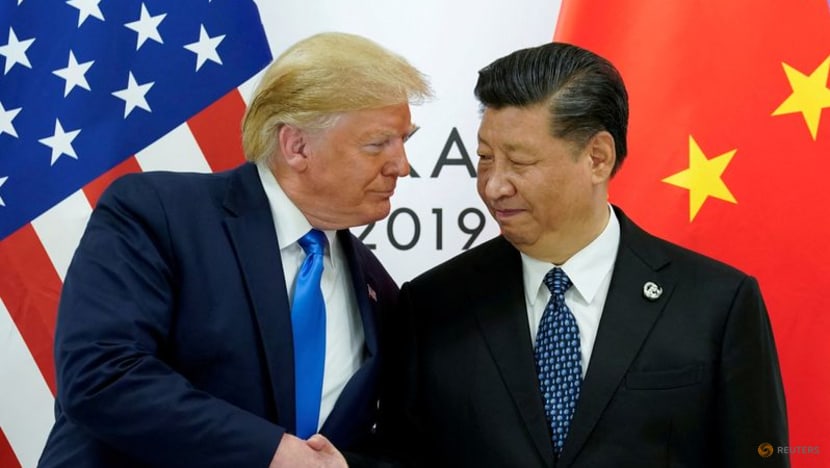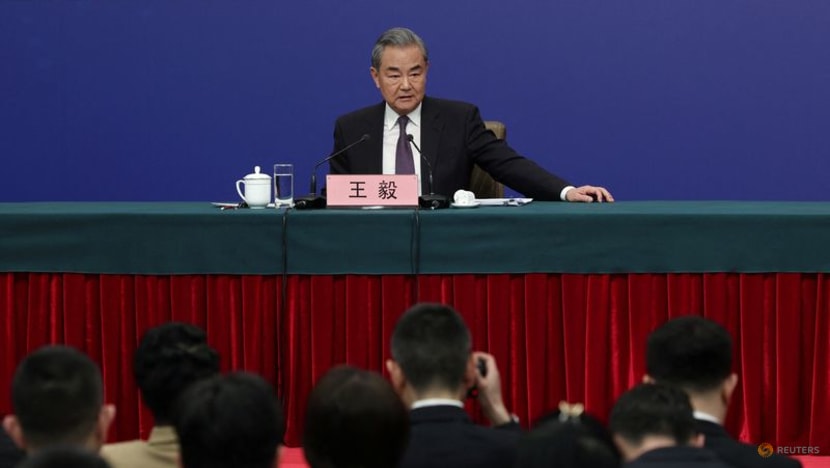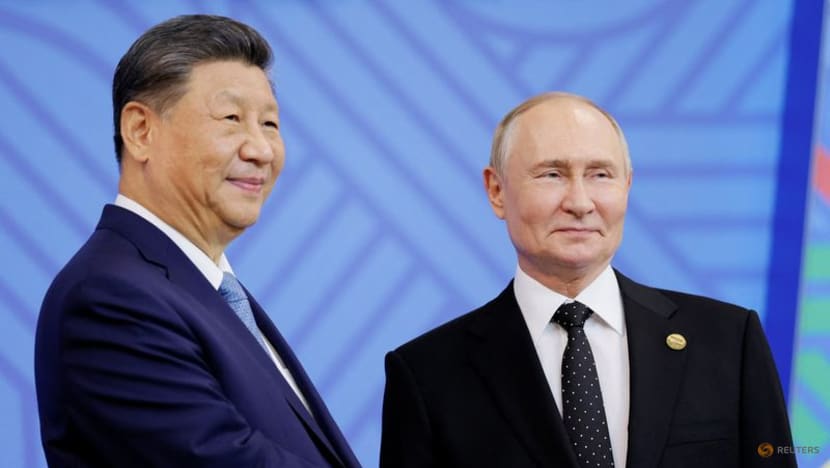analysis East Asia
Rebuffing ‘might is right’: China seeking to score points at the US’ expense, but could it backfire?
Remarks by China’s top diplomat Wang Yi on Mar 7 aim to portray the country as a responsible global player, contrasting with the US’ unilateral turn, say analysts. Whether Beijing is seen as walking the talk is the rub.


This audio is generated by an AI tool.
BEIJING: China’s latest pitch for major powers to rebuff a “might is right” approach and be globally responsible is carefully crafted to win over countries by portraying itself as a benign, international player, say analysts.
Observers note that Beijing could very well carve out some gains in the short run, especially as the United States under Donald Trump edges towards expansionism and unilateralism under its “America First” banner, isolating some of its closest allies.
“In the current context, the messaging that China is trying to show is that … China is making active contributions, and this message of China shouldering its responsibility stands in contrast to the actions of another state,” analyst Hoo Tiang Boon from Singapore’s Nanyang Technological University (NTU) told CNA.
The associate professor at the School of Social Sciences added that it's easier for China now to sell this message when the US is now being accused of undermining the very order that it helped to create.
Since taking office on Jan 20, Trump has pulled the US out of international outfits like the World Health Organization and United Nations Human Rights Council while enacting a funding freeze on US foreign assistance.
But whether this momentum can be maintained is another matter, analysts caution. It could even backfire if China, a major power in its own right, is not seen as walking the talk, especially in the wake of precedents.
“LAW OF THE JUNGLE”
China’s top diplomat Wang Yi made the case for major powers to be responsible during a 90-minute news conference on the sidelines of the Two Sessions on Friday (Mar 7).
In a veiled reference to the US, Wang warned that if big countries operate on a “might is right” basis, the world order would be much worse for it.

“There are more than 190 countries in the world,” the veteran diplomat, who’s also the foreign minister, remarked.
“Should everyone stress ‘my country first’ and obsess over a position of strength, the law of the jungle would reign again, smaller and weaker countries would bear the brunt first, and international norms and order would take a body blow,” he added.
Analysts point to Washington’s increasingly hardline stance on Ukraine and its perceived tilt toward Russia as the catalyst for Wang’s remarks.
Following the high-profile row between President Donald Trump and Ukrainian President Volodymyr Zelenskyy at the White House last Friday (Feb 28), the US paused all military aid to Ukraine and halted intelligence sharing with the war-torn country.
At the same time, Washington has been pushing for peace negotiations with Moscow while excluding Kyiv from the initial meeting. The US also voted against a Ukraine-related vote at the United Nations General Assembly, aligning with Russia and the likes of North Korea and Belarus.
Carl Thayer, emeritus professor at the University of New South Wales (UNSW) Canberra, described the Trump administration’s recent moves as an “own goal” that gave China an opportunity to reiterate its position.
“Wang Yi is taking advantage of this … to claim the moral high ground with uncommitted developing countries, particularly the Global South and ASEAN (Association of Southeast Asia) member states,” Thayer said.
He added that Beijing’s strong response is also driven by concerns that Trump is attempting to drive a wedge into the China-Russia self-professed “no limits” partnership.

SINO-US TENSIONS WEIGH HEAVY
Wang’s remarks on the sidelines of the Two Sessions signal that Beijing’s escalating competition with Washington remains a key pressure point for the Chinese leadership, say analysts.
Wu Se-chih, director of Taiwan Thinktank's China Research Center, noted that most of what emerges from the annual political meetings are primarily aimed at a domestic audience rather than an international one.
“(Wang’s rhetoric) reflects the internal pressures Xi Jinping is currently facing, requiring him to project strength externally - through rhetoric or strategic positioning - to reinforce his authority at home,” he said, referring to the Chinese president.
Given this, Wu suggested it is reasonable to expect China to take an even tougher stance in its future dealings with the US.
"That said, if we compare this approach to China’s response during Trump’s first term, Beijing may exercise slightly more restraint this time.
“While China is expected to retaliate against Trump’s potential new tariffs, it is unlikely to match US measures on a one-to-one basis as it did eight years ago. Instead, its countermeasures may be more calculated, though still assertive," he said.
At the same time, Wu pointed out that this year marks the midpoint of the policies outlined during China’s 20th party congress in 2022, and China must prepare for the next quinquennial affair.
With Xi aiming to further consolidate power and push forward China’s long-term strategic goals, showing weakness to the US is simply not an option, he said.
WITH MAJOR POWER COMES MAJOR RESPONSIBILITY
In his Friday remarks, Wang, who’s the top diplomat by virtue of his concurrent position as head of the Central Foreign Affairs Commission of China’s Communist Party, had asserted that major powers should lead the charge in sustaining the international order.
“Major powers, in particular, should lead by example in upholding integrity and the rule of law, opposing double standards and selective application, and should never engage in bullying, market manipulation, or plunder.”
Analysts say Wang's remarks were intended to portray China as a responsible major power, especially when juxtaposed against the expansionist and unilateral actions taken by the US under Trump.
But while some nations, especially developing states, may be convinced to draw closer to Beijing, analysts say not all will be convinced.
“(While) easier for China to position itself in this light, whether countries actually buy this is another story completely,” noted NTU’s Hoo.
Beijing’s strategy could also backfire in the long run if it is perceived to not be practising what it preaches, observers point out.
It is “almost indisputable” that China is a major power today, and it has been treated as such by other countries, noted NTU’s Hoo. At the same time, he pointed out that the country has been selective in highlighting this point.
“Depending on (the) international forum, China sort of switches identity as and when it fits its purposes … on occasions in certain forums like the World Trade Organization, China has actually disclaimed itself from its major power status and tried to say it is a developing country.
“That's the time where it’s also trying to build bonds and solidarity with the Global South,” said Hoo, referring to developing countries that are poorer, have higher levels of income inequality and suffer lower life expectancy.
Many of these countries are in the Southern Hemisphere, largely in Africa, Asia and Latin America.
PRACTISING WHAT IS PREACHED
China’s reputation will take a hit if it is seen as expanding its influence through overt coercion, or seemingly beneficial tactics that carry hidden pitfalls, said Wu Se-chih, director of Taiwan Thinktank's China Research Center.
“China’s Belt and Road Initiative (BRI), for instance, has contributed to debt crises in weaker nations, raising concerns about sovereignty risks during financial distress,” he told CNA.
“If China positions itself as a strong and responsible global player, such actions expose certain contradictions in its approach.”
China itself has even leveraged its power to counter political disagreements, said Thayer from UNSW Canberra, who questioned the sincerity of Wang’s remarks and described them as “in line with China’s information warfare”.
He highlighted Beijing’s trade sanctions on Australian exports from 2020, which targeted coal and agricultural products, after Canberra called for an inquiry into the origins of COVID-19.
These measures inflicted significant economic losses on Australia, Thayer noted. Most of the curbs were progressively removed after a new government won power in Canberra in 2022.
A study published in January 2024 in the Australian Economic Papers estimated that Australia’s gross export losses in the Chinese market due to trade sanctions soared from A$3 billion (US$1.89 billion) in 2020 to A$31 billion in 2022.
“China’s punitive economic sanctions against Australia were a perfect example of the law of the jungle … (they) were aimed at cowing any nation that had the temerity to follow Australia in standing up to China,” Thayer asserted.
Wu from Taiwan Thinktank pointed out that while the US, despite its global dominance, generally operates within established international norms, China’s position on global moral leadership remains unclear.
Wang’s remarks may alienate more countries, as China “lacks the credibility” to lecture others on what it means to be a major power, he told CNA, referencing the BRI examples as well as allegations by Canada that China interfered in its elections.
UNSW Canberra’s Thayer expressed similar sentiments. “Statements like these just convince the majority of the world’s countries that they should not take sides between the United States and China,” he said.
Smaller nations recognise the escalating rivalry between the two powers and are reluctant to be drawn into their competition, Thayer explained.
China’s increasing assertiveness in the South China Sea could also prove problematic as it seeks to garner and sustain goodwill from countries, observers note.
China claims almost all of the South China Sea. In recent months, tensions have flared with the Philippines, which, like several other Southeast Asian states, has overriding claims in the disputed waters.

Aggressive behaviour in the South China Sea is one of the top geopolitical concerns for the region, according to last year’s State of Southeast Asia survey conducted by ISEAS-Yusof Ishak Institute.
However, despite some alleging a contradiction between China’s words and its actions in the contested waters, the Chinese don’t see it as such, said NTU’s Hoo, who noted that it is ultimately a matter of perception.
“(To China), even as (it) upholds its responsibilities to the world and actively contributes, that doesn't mean it can allow others to undermine and to compromise its interests, particularly its core interests,” he said.
He added that China will argue that it is not actually pulling its weight around and is just doing whatever is necessary to defend its interests.
“Imagine you have a lion, and a smaller animal infringes on its territory. If the lion were to bite the smaller animal, you can’t say that the lion is flexing its muscles,” said Hoo.
“Because the lion is intrinsically more powerful than the smaller animal, and it’s just biting it for infringing on its territory.”






















